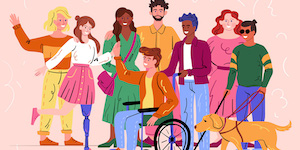Welcome
 At the University of Maryland School of Social Work, we value accessibility, neurodiversity, and the varied ways in which we embody and physically engage with content and spaces. A commitment to disability justice is part of our mission to foster a culture of inclusion and belonging both within our school and our greater society.
At the University of Maryland School of Social Work, we value accessibility, neurodiversity, and the varied ways in which we embody and physically engage with content and spaces. A commitment to disability justice is part of our mission to foster a culture of inclusion and belonging both within our school and our greater society.
